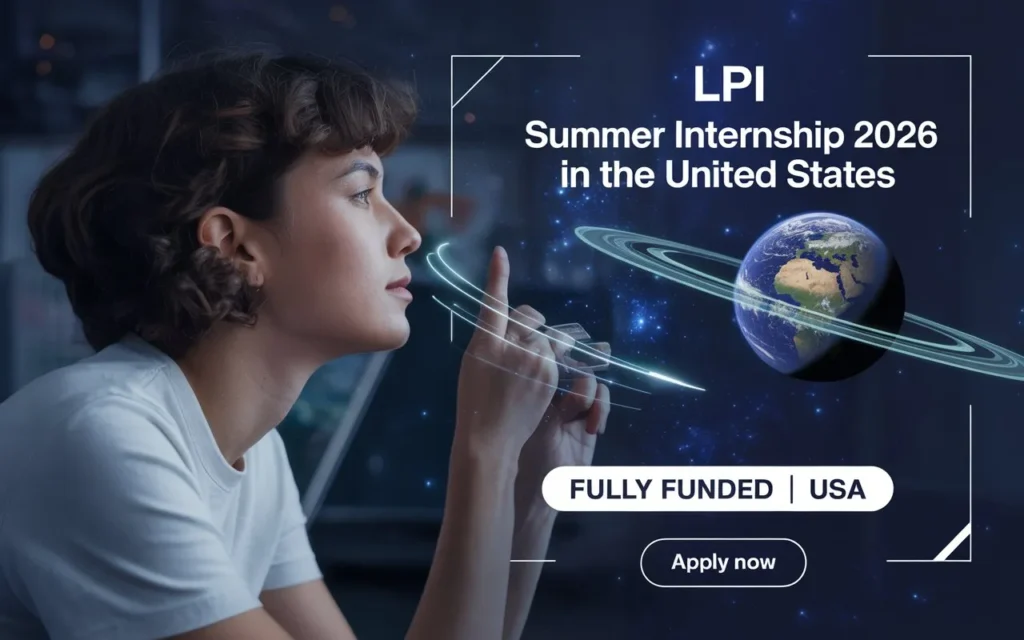The Lunar and Planetary Institute (LPI) has announced applications for the LPI Summer Internship 2026 in the United States, in collaboration with NASA’s Johnson Space Center. This prestigious and fully funded internship is designed to give undergraduate students from around the world a hands-on research experience in planetary and space sciences.
The duration of this internship is for ten intensive weeks. Participants will work alongside leading planetary scientists, researchers, and NASA experts in Houston, Texas. The program offers a rare opportunity to participate in genuine space research, encompassing studies of the Moon, Mars, asteroids, meteorites, and other celestial bodies.
The LPI internship not only equips students with scientific and analytical skills but also helps them explore diverse career paths within planetary science, astrophysics, and space exploration. By engaging in collaborative research, students will gain exposure to the methods, technologies, and questions that drive NASA’s planetary missions.
This program is ideal for students eager to understand how data from spacecraft and telescopes are analyzed, interpreted, and used to expand our understanding of the solar system. The LPI Internship 2026 welcomes applicants from both the United States and other countries, fostering a global community of aspiring space scientists.
Interested candidates can apply for this LPI Summer Internship 2026 before the deadline December 12, 2025.
In this article, we explored every key details for this scholarship.

Internship Overview
| Program Name | LPI Summer Internship 2026 |
| Host Country | United States |
| Host Institutions | Lunar and Planetary Institute (LPI) and NASA Johnson Space Center |
| Location | Houston, Texas |
| Duration | 10 Weeks |
| Financial Coverage | Fully Funded ($13,351 + $1,500 completion bonus) |
| Program Dates | June 1 – August 7, 2026 |
| Financial Coverage | Fully Funded |
| Application Deadline | December 12, 2025 |
About the LPI Summer Internship
The LPI Summer Internship Program provides undergraduate students with the opportunity to conduct cutting-edge research in planetary science. Each participant is assigned to a research project under the supervision of a scientist at LPI or NASA Johnson Space Center.
Interns work on a wide range of research areas, including planetary geology, geochemistry, geophysics, remote sensing, and climate science. They also attend lectures and professional development sessions that prepare them for future graduate studies and research careers.
The program emphasizes collaboration, scientific communication, and networking—key elements for success in the global research community.
Why You Should Apply
Participating in the LPI Summer Internship offers much more than research experience—it opens the door to an international network of scientists, mentors, and peers passionate about space exploration. Students gain:
- Direct research experience at world-class institutions
- Mentorship from NASA and LPI scientists
- Professional development workshops and career guidance
- Exposure to real-world planetary science projects
- A valuable credential that strengthens applications for graduate programs and research fellowships
Many former LPI interns have gone on to pursue advanced studies or careers with NASA, academic institutions, and international research organizations.
Financial Benefits
The LPI Summer Internship 2026 is a fully funded program, meaning all essential expenses are covered for the selected students. Each intern will receive a total financial support package of $13,351, which includes:
- Airfare tickets to and from the United States
- Monthly stipend for personal and research expenses
- Housing costs (paid directly to the housing provider)
- Living and daily expenses
In addition, interns who complete the program and meet its requirements will receive a bonus allowance of $1,500.
This comprehensive funding ensures that financial limitations do not hinder talented students from participating in this remarkable research experience.
ALSO READ: MBZUAI UGRIP Research Internship 2026 in UAE
Preferred Academic Background
While applications are welcome from students of all disciplines, preference is given to candidates majoring in the following fields:
- Physical or Natural Sciences
- Engineering
- Computer Science
- Mathematics
Students with relevant coursework or research experience in planetary or space science will have a competitive advantage during the selection process.
Eligibility Criteria
To apply for the LPI Summer Internship 2026, applicants must meet the following conditions:
- Open to all nationalities, including U.S. citizens and international students.
- Applicants must be undergraduate students who have completed at least 50 semester hours of credit before the internship begins.
- IELTS is not mandatory. Applicants can demonstrate English proficiency through other means (see below).
Required Application Materials
Applicants are required to prepare and submit the following documents through the online portal:
- Online Application Form (all forms must be completed electronically)
- Two to Three Reference Letters
- Official Academic Transcripts
- Proof of English Proficiency – provide any one of the following:
- TOEFL score
- IELTS score
- A letter from your current institution confirming your English language ability
Note: Paper or mailed applications will not be accepted.
How to Apply for the LPI Summer Internship 2026
The application process for the LPI Summer Internship is completely online. Interested applicants must submit their forms and required documents through the official application portal before the deadline.
Application Deadline: December 12, 2025
Apply Online: Visit the official website of the LPI Summer Internship Program to complete your application and access detailed information about research areas and mentors.
Frequently asked questions
1. Where does the internship take place?
At the Lunar and Planetary Institute or NASA Johnson Space Center, Houston, USA.
2. What are the dates?
June 1 – August 7, 2026 (10 weeks).
3. Do I need IELTS?
No. English proof can be shown through TOEFL, IELTS, or a letter from your university.
4. What fields are preferred?
Physical or Natural Sciences, Engineering, Computer Science, or Mathematics.

